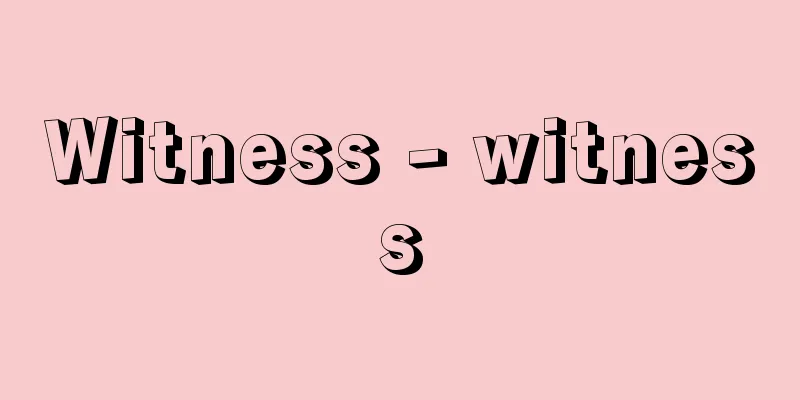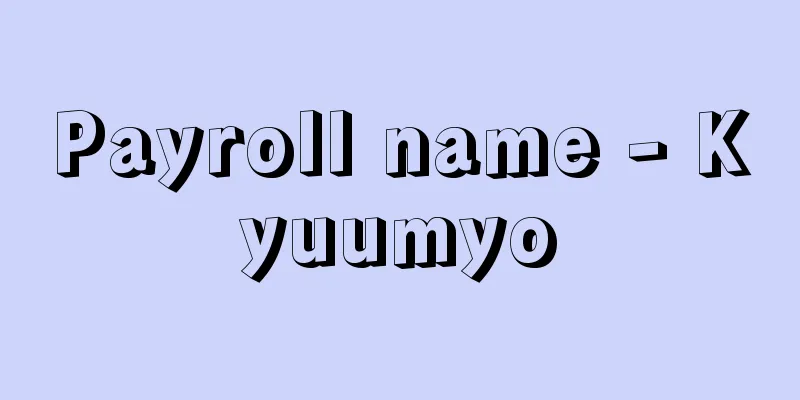Witness - witness

|
A third party who may be ordered to testify to a court or other body (either House of the Diet or a local assembly) about what he or she knows from personal experience. [Ichiro Uchida April 18, 2018] Witness in criminal proceedingsA type of witness, a third party in a lawsuit who presents facts that he or she actually experienced outside of court proceedings to the court. (1) Witnesses are obligated to appear (Articles 150, 151, 152, 153-2, 162 of the Code of Criminal Procedure), to take an oath (Articles 154, 160, 161 of the Code of Criminal Procedure), and to testify (Articles 160, 161 of the Code of Criminal Procedure). If a witness who has taken an oath makes a false statement, he or she will be charged with perjury (Article 169 of the Penal Code). In order to question a witness about facts related to official secrets that a public official or former public official who is bound by a confidentiality obligation has come to know, the consent of the relevant supervisory authority (Article 144, main text of the Code of Criminal Procedure), the House of Representatives or the House of Councillors (Article 145, paragraph 1, item 1 of the Code of Criminal Procedure), or the Cabinet (Article 145, paragraph 1, item 2 of the Code of Criminal Procedure) may be required (Article 144, proviso, Article 145, paragraph 2 of the Code of Criminal Procedure). On the other hand, as a right of a witness, any person may refuse to testify if there is a risk that he or his legal relatives may be criminally prosecuted or convicted (right to refuse to testify) (Articles 146 and 147 of the same law). This right is based on the privilege against self-incrimination under Article 38, paragraph 1 of the Constitution. However, the amendment to the Code of Criminal Procedure in 2016 introduced the so-called criminal immunity system, which makes it possible to grant criminal immunity to witnesses, eliminate their right to refuse to testify, and compel them to testify in accordance with their obligation to testify (Articles 157-2 and 157-3 of the same law). In addition, persons who hold or have held certain positions may, in principle, refuse to testify about facts related to the secrets of others that they have come to know as a result of being entrusted with their work (Article 149 of the same law). Witnesses have the right to claim travel expenses, daily allowances, and accommodation fees (Article 164, paragraph 1 of the same law). (2) Regarding the witness protection system, first, in the case of witness protection in open court, the 2007 amendment to the Code of Criminal Procedure made it possible to decide not to disclose the name, address, or other information that identifies the victim in open court (concealment of information that identifies the victim) of a victim witness in certain cases, such as sexual crimes (Article 290-2 of the Code of Criminal Procedure). This witness protection was extended to witnesses other than victims in general by the 2016 amendment to the Code of Criminal Procedure, and it became possible to make a decision not to disclose information that identifies a witness in open court in cases where there is a risk of harm to the witness or of disturbing the peace of the witness (Article 290-3 of the Code of Criminal Procedure). It also became possible to make a decision to conceal information that identifies a witness when reading out an indictment or evidentiary documents (Article 291, paragraphs 2 and 3, Article 305, paragraphs 3 and 4, Article 295, paragraph 4 of the Code of Criminal Procedure). Secondly, in the case of the method of questioning witnesses such as victims, the amendment to the Code of Criminal Procedure in 2000 made it possible to question witnesses by video link. The court may have the witness present in a place other than the courtroom in the same premises and question him/her by video link, which allows the witnesses to communicate while being aware of each other's status through the transmission of video and audio (Article 157-6, Paragraph 1 of the same law). The 2016 amendment to the Code of Criminal Procedure changed the video link method, which was limited to the same premises, to allow witness questioning in a place other than the same premises (for example, a court in a remote location) (Article 157-6, Paragraph 2 of the same law). In addition, in order to reduce the mental burden of testifying in front of the defendant and spectators, it is now possible to take measures to shield the witness from the defendant and spectators, such as a partition (Article 157-5 of the same law). Furthermore, if there is a risk that the witness will feel extremely anxious or nervous, a suitable person may be appointed as a witness attendant (Article 157-4 of the same law). Third, with regard to witness protection measures in the disclosure of evidence, the 1999 amendment to the Code of Criminal Procedure permitted prosecutors to request that the addresses, etc. of witnesses, etc. be kept secret from related parties in order to prevent harm to the body or property of witnesses, etc. (Article 299-2 of the Code of Criminal Procedure), and the 2007 amendment to the Code of Criminal Procedure permitted prosecutors to request that victim-identifying information be kept secret from the defendant, etc. (Article 299-3 of the Code of Criminal Procedure). Furthermore, the 2016 amendment to the Code of Criminal Procedure permitted conditional disclosure measures under which the names and addresses of witnesses, etc. will not be disclosed to the defendant (Article 299-4, paragraph 1 of the Code of Criminal Procedure), or alternative disclosure measures that provide an opportunity to learn a designation or contact information in lieu of a witness' name or address in lieu of a witness' address (Article 299-4, paragraph 2 of the Code of Criminal Procedure). [Ichiro Uchida and Morikazu Taguchi, April 18, 2018] Witness in civil proceedingsA witness in a civil lawsuit is a third party who, by order of the court, must testify in court about specific facts that he or she has personally experienced in the past. Since the truth of the factual statements of the parties is determined by the testimony of the witness, the parties and their legal representatives are not qualified to be witnesses, but anyone who is able to recognize facts and testify about them in court is competent to be a witness (Civil Procedure Act, Article 190 et seq.). Therefore, in civil cases, unless otherwise specified, all persons subject to the judicial power of Japan have a public law obligation to appear, take an oath, and testify as a witness, and refusal to do so is punishable by sanctions, and false testimony despite taking an oath is punishable by perjury. However, witnesses may refuse to testify in cases involving official or professional secrets as specified in Articles 196 and 197 of the same law, and in cases that may lead to prosecution or punishment of the witness or his or her relatives. These persons are granted the right to refuse to testify. [Takeyoshi Uchida and Tetsuo Kato] Parliamentary review and investigationIt refers to a person who is compelled to appear and give testimony when necessary for the examination or investigation of a bill or other matter by each House of the Diet or the assembly of an ordinary local public entity (Article 62 of the Constitution of Japan, Articles 53 and 257 of the Rules of the House of Representatives, Article 182 of the Rules of the House of Councillors, Article 100 of the Local Autonomy Law). During the Meiji Constitution, each House was not able to summon the people (Article 73 of the Houses Law), so the investigative power was extremely weak. In contrast, the Japanese Constitution gives each House of the Diet the power to request witnesses to appear, which is equivalent to that of a court (Article 62 of the Constitution), and the Law on Witnesses' Oaths and Testimony in the Houses of the Diet (House of the Diet Testimony Law), which specifies the procedures for summoning witnesses, was enacted as a detailed procedure for implementing this power. According to this law, if a witness is called to appear as a witness by a House of the Diet, he or she is obligated to do so (Article 1), and if a sworn witness gives a false statement, he or she will be punished with imprisonment of three months to ten years (Article 6), and if he or she fails to appear or refuses to take the oath or testify without a reason, he or she will be punished with imprisonment of one year or a fine of up to 100,000 yen (Article 7). However, if a public official is called to testify regarding a confidential matter related to his or her official duties, approval from the administrative agency is required (Article 5). The right to request witnesses to appear for such investigations is also stipulated for the assemblies of ordinary local public entities, and failure to appear or refuse to testify will be punished with imprisonment of up to six months or a fine of up to 100,000 yen (Local Autonomy Law, Article 100). [Masaaki Ikeda] [References] | | | | | | | | | |Source: Shogakukan Encyclopedia Nipponica About Encyclopedia Nipponica Information | Legend |
|
裁判所その他の機関(国会の両議院、地方議会)に対し自己の経験から知りえたことを供述するよう命ぜられる第三者をいう。 [内田一郎 2018年4月18日] 刑事訴訟における証人人証の一種で、訴訟外において実際に経験した事実を裁判所に対して陳述する訴訟の第三者をいう。 (1)証人には出頭の義務があり(刑事訴訟法150条、151条、152条、153条の2、162条)、宣誓の義務があり(同法154条、160条、161条)、証言の義務がある(同法160条、161条)。宣誓した証人が虚偽の陳述をした場合は偽証罪に問われる(刑法169条)。守秘義務を負う公務員または公務員であった者が知りえた公務上の秘密に関する事実について証人尋問をするには、当該監督官庁(刑事訴訟法144条本文)、衆議院または参議院(同法145条1項1号)、内閣(同法145条1項2号)の承諾を要する場合がある(同法144条但書、145条2項)。他方、証人の権利として、何人(なんぴと)も自己または法定の近親者が刑事訴追を受けまたは有罪判決を受けるおそれのある証言を拒むことができる(証言拒絶権)(同法146条、147条)。憲法第38条1項の自己負罪拒否特権に基づく権利である。ただし、2016年(平成28)の刑事訴訟法改正により、いわゆる刑事免責制度が導入されたので、証人に刑事免責を付与してその証言拒絶権を消滅させたうえ、証人の証言義務に従って証言を強制することが可能となった(同法157条の2、157条の3)。また、一定の職にある者またはあった者は、業務上委託を受けたために知りえた他人の秘密に関する事実について、原則として証言を拒むことができる(同法149条)。なお、証人には、旅費・日当・宿泊料の請求権がある(同法164条1項)。 (2)証人保護の制度として、第一に、公開法廷における証人保護として、2007年の刑事訴訟法改正は、性犯罪等一定の事件の場合に、被害者証人の氏名・住居その他被害者を特定させる事項を公開の法廷で明らかにしない決定(被害者特定事項の秘匿)をすることができることとなった(同法290条の2)。この証人保護は、2016年の刑事訴訟法改正により、被害者以外の証人一般に認められることになり、証人に対する加害のおそれや証人の平穏が害されるおそれがある等の場合に、証人等を特定する事項を公開の法廷で明らかにしない秘匿決定をすることができるようになり(同法290条の3)、その他起訴状や証拠書類の朗読にあたっての証人特定事項の秘匿決定も可能となった(同法291条2項・3項、305条3項・4項、295条4項)。第二に、被害者等の証人尋問の方法について、2000年の刑事訴訟法改正により、いわゆるビデオリンク方式の証人尋問が可能となった。裁判所は、同一構内にある公判廷以外の場所に証人を在席させ、映像と音声の送受信により相手の状態を相互に認識しながら通話することのできるビデオリンク方式によって尋問することができる(同法157条の6第1項)。なお、2016年の刑事訴訟法改正により、上記の同一構内に限ったビデオリンク方式が改められ、同一構内以外の場所(たとえば遠隔地の裁判所)でのビデオリンク方式による証人尋問も可能となった(同法157条の6第2項)。また、被告人や傍聴人の面前で証言することの精神的負担を軽減するため、証人と被告人や傍聴人との間に衝立(ついたて)などの遮蔽(しゃへい)措置をとることができることとなった(同法157条の5)。さらに、証人が著しく不安または緊張を覚えるおそれがある場合には、適当な者を証人付添人とすることができるとされた(同法157条の4)。第三に、証拠開示における証人保護措置として、まず1999年(平成11)の刑事訴訟法改正は、検察官は、証人等の身体・財産への加害行為等を防止するため、証人等の住所等を関係者に知られないようにする配慮を求めることができるとしたが(同法299条の2)、2007年の刑事訴訟法改正により、被害者特定事項を被告人等に知られないようにすることを求めることができるとされ(同法299条の3)、さらに、2016年の刑事訴訟法改正により、証人等の氏名・住所を被告人に知らせない旨の条件付開示の措置(同法299条の4第1項)または氏名にかわる呼称や住居にかわる連絡先を知る機会を与える代替開示の措置が認められた(同法299条の4第2項)。 [内田一郎・田口守一 2018年4月18日] 民事訴訟における証人民事訴訟の証人とは、裁判所の命により自ら過去において実験した具体的事実を裁判所において供述すべき訴訟の第三者をいう。証人の証言によって、当事者の事実上の陳述の真偽を判断するものであるから、当事者および当事者を代表する法定代理人には、証人としての適格はないが、そのほか、事実を認識することができ、かつ裁判所でそれを供述できる者には、すべて証人としての能力がある(民事訴訟法190条以下)。したがって、民事事件について、とくに規定ある場合のほかは、日本の司法権に服する者はすべて証人として出頭・宣誓・供述すべき公法上の義務があり、その拒否に対しては制裁を科せられ、また宣誓をしたにもかかわらず虚偽の供述をしたときは、偽証罪として処罰される。ただし、同法第196条、197条所定の公務上あるいは職業上の秘密に関する事項および証人またはその親族等の訴追または処罰を招くおそれのある事項に関するときは、証人は証言を拒める。これらの人には証言拒絶権が認められている。 [内田武吉・加藤哲夫] 議会における審査・調査国会の各議院もしくは普通地方公共団体の議会が、議案その他の審査または調査のため、必要あるとき、強制的に出頭させ証言させる人をいう(日本国憲法62条、衆議院規則53条、257条、参議院規則182条、地方自治法100条)。明治憲法の時代は、各議院は人民を召喚することができなかった(議院法73条)ので、調査権はきわめて弱かった。 それにひきかえ日本国憲法においては、国政調査権強化のために、各議院に裁判所に準ずる証人出頭要求権などが与えられ(憲法62条)、その実施のための細目として証人喚問の手続を定めた「議院における証人の宣誓及び証言等に関する法律(議院証言法)」が制定された。それによれば、各議院から証人として出頭を求められればそれに応ずることが義務とされ(1条)、宣誓した証人が虚偽の陳述をすれば3か月以上10年以下の懲役に(6条)、理由なく出頭せず、または宣誓・証言を拒んだときは1年以下の禁錮または10万円以下の罰金に処せられる(7条)。ただし公務員について職務上の秘密に関して証言を求められたときは、行政庁の承認が必要とされる(5条)。このような調査のための証人出頭要求権は、普通地方公共団体の議会についても定められており、不出頭・証言拒絶に対しては6か月以下の禁錮または10万円以下の罰金に処せられることになっている(地方自治法100条)。 [池田政章] [参照項目] | | | | | | | | | |出典 小学館 日本大百科全書(ニッポニカ)日本大百科全書(ニッポニカ)について 情報 | 凡例 |
Recommend
The Last Lantern Scroll
A collection of letters by Shinran. Shinran stoppe...
Qasim Khan (Kazakh) (English spelling)
...They were called Özbeg-Qazaq, or simply Qazaq ...
Imazu [town] - Imazu
An old town in the northwest of Lake Biwa, Takashi...
Mount Gyokusen
A mountain in the western suburbs of Beijing, Chin...
Trilobitomorpha
…The Burgess Shale, which corresponds to the Midd...
Country house (English spelling)
In England, a town house is the main residence of ...
Urakawa [town] - Urakawa
A town in Urakawa County in south-central Hokkaido...
Diaphragm
When a fluid osmotically passes through a thin mem...
Azainden - Azainden
…It is a heterocyclic aromatic compound, also cal...
Nashiki Shrine - Nashiki Shrine
The shrine is located in Teramachi-dori Hirokojia...
Akobujo - Akobujo
〘Noun〙 One of the Noh masks. A mask that depicts a...
Polarization - Culture
[ I ] [See alternative terms] Molar polarization ...
Rotary piston engine
…Piston engines require a piston-crank mechanism ...
Nobuzane Fujiwara
Dates of birth and death unknown. Court painter a...
Plant Region
This refers to regions into which the flora of th...









